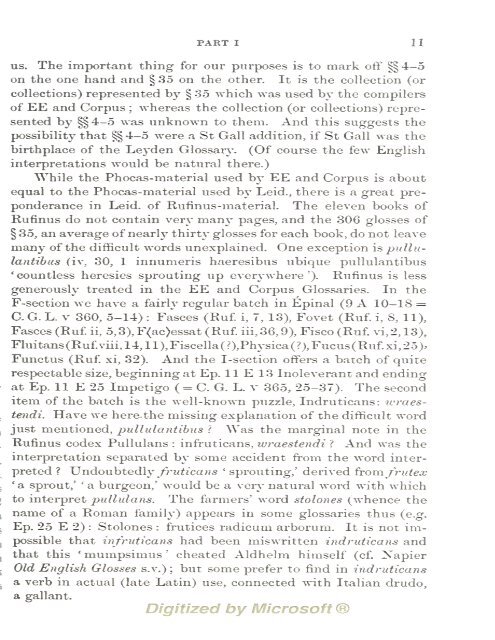the corpus, épinal, erfurt and leyden glossaries, viii - World eBook ...
the corpus, épinal, erfurt and leyden glossaries, viii - World eBook ...
the corpus, épinal, erfurt and leyden glossaries, viii - World eBook ...
Create successful ePaper yourself
Turn your PDF publications into a flip-book with our unique Google optimized e-Paper software.
. The<br />
PART I 11<br />
import-ant thing for our purposes is to mark off ^4-5<br />
<strong>the</strong> one h<strong>and</strong> <strong>and</strong> § 35 on <strong>the</strong> o<strong>the</strong>r. It is <strong>the</strong> collection (or<br />
1 lections) represented by § 35 which was used by <strong>the</strong> compilers<br />
EE <strong>and</strong> Corpus ;<br />
whereas <strong>the</strong> collection (or collections) represented<br />
by ^ 4-5 was unknown to <strong>the</strong>m. And this suggests <strong>the</strong><br />
possibility that ^ 4-5 were a St Gall addition, if St Gall was <strong>the</strong><br />
birthplace of <strong>the</strong> Leyden Glossa^}^ (Of course <strong>the</strong> few English<br />
interpretations would be natural <strong>the</strong>re.)<br />
While <strong>the</strong> Phocas-material used by EE <strong>and</strong> Corpus is about<br />
equal to <strong>the</strong> Phocas-material used by Leid., <strong>the</strong>re is a great pre-<br />
in Leid. of Rufinus-material. The eleven books of<br />
ponderance<br />
Rufinus do not contain very man}' pages, <strong>and</strong> <strong>the</strong> 306 glosses of<br />
§ 35, an average of nearly thirty glosses for each book, do not leave<br />
many of <strong>the</strong> difficult words unexplained. One exception is pullulantibus<br />
(iv, 30, 1 innumeris haeresibus ubique pullulantibus<br />
'countless heresies sprouting up everj-where '). Rufinus is less<br />
generously treated in <strong>the</strong> EE <strong>and</strong> Corpus Glossaries. In <strong>the</strong><br />
F-section we have a fairly regular batch in Epinal (9 A 10-18 =<br />
C. G. L. V 360, 5-14) : Fasces (Ruf i, 7, 13), Fovet (Ruf. i, 8, 11),<br />
Fasces (Ruf ii, 5,3),F(ac)essat (Ruf. iii,36,9), Fisco (Ruf. vi,2,13),<br />
Fluitans(Ruf<strong>viii</strong>,14,ll),Fiscella(0,Physica(?),Fucus(Ruf.xi,25),<br />
Functus (Ruf xi, 32). And <strong>the</strong> I-section offers a batch of quite<br />
respectable size, beginning at Ep. 11 E 13 Inoleverant <strong>and</strong> ending<br />
at Ep. 11 E 25 Impetigo ( - C. G. L. v 365, 25-37). The second<br />
item of <strong>the</strong> batch is <strong>the</strong> well-known puzzle, Indruticans: turaes-<br />
tendi. Have we here-<strong>the</strong> missing explanation of <strong>the</strong> difficult word<br />
note in <strong>the</strong><br />
just mentioned, pullulantibus ( Was <strong>the</strong> marginal<br />
Rufinus codex Pullulans : infruticans, wraestendi i And was <strong>the</strong><br />
interpretation separated by<br />
preted ? Undoubtedly /Vu^i'ca/js<br />
'a sprout,' '<br />
some accident fi-om <strong>the</strong> word inter-<br />
*<br />
sprouting,' derived hovafrutex<br />
a burgeon,' would be a very natural word with which<br />
to interpret pidlulam. The farmers' word stolones (whence <strong>the</strong><br />
name of a Roman family) appears in some <strong>glossaries</strong> thus (e.g.<br />
Ep. 25 E 2)<br />
: Stolones : frutices radicum arborum. It is not im-<br />
possible that infruticans<br />
that this '<br />
mumpsimus<br />
'<br />
had been miswritten indruticans <strong>and</strong><br />
cheated Aldhelm himself (cf. Napier<br />
Old English Glosses s.v.) ; but some prefer to find in indruticans<br />
a verb in actual (late Latin) use, connected with Italian drudo,<br />
a gallant.

















